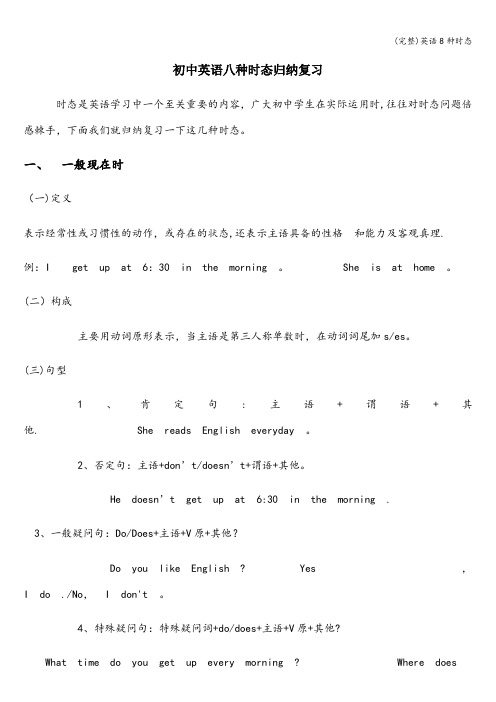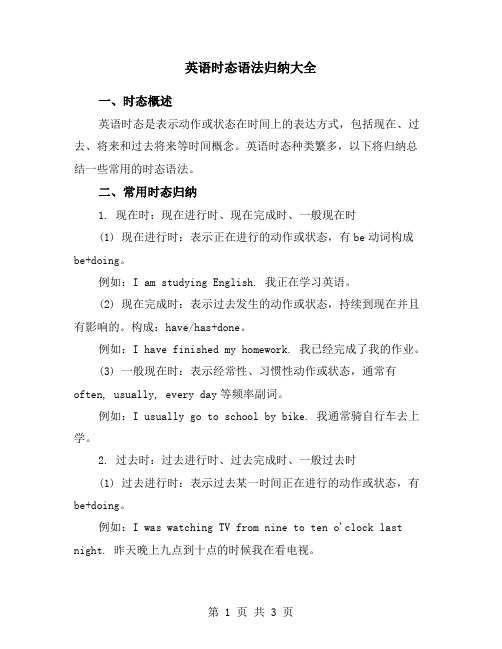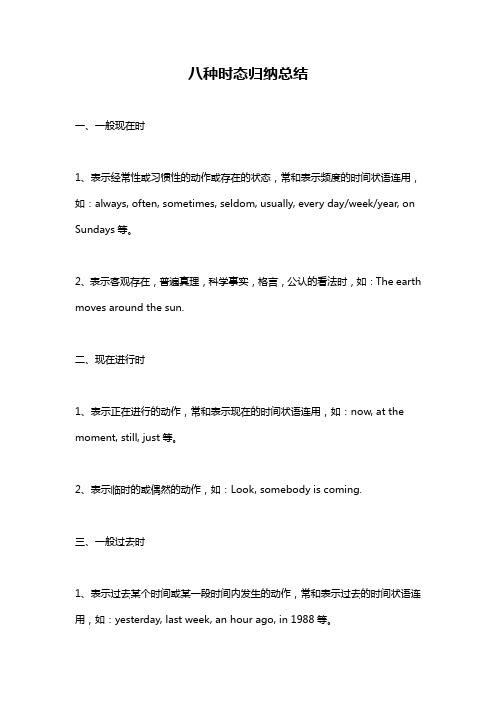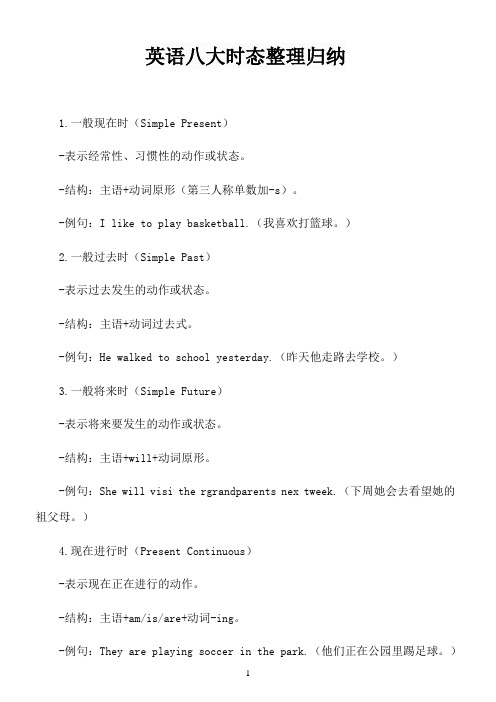时态用法归纳
时态知识点归纳与总结

时态知识点归纳与总结时态是英语语法中一个非常重要的概念,它可以用来表示不同的时间关系。
正确使用时态不仅可以使语言表达更加准确,还可以帮助我们更好地理解和阅读英语文本。
本文将对常见的时态进行归纳和总结,为读者提供参考。
一、一般现在时(Simple Present)一般现在时用来表示经常性的动作、习惯、真理和客观事实。
1. 动词原形表示普通动作:e.g. She plays basketball every Sunday.2. 加-s或-es的第三人称单数:e.g. Tom usually eats breakfast at 8 o'clock.3. 不可数名词和复数名词本身就表示复数意义:e.g. Dogs are loyal animals. Water boils at 100 degrees Celsius.二、现在进行时(Present Continuous)现在进行时用来表示当前正在进行的动作。
1. be动词的各种形式+动词-ing形式:e.g. He is reading a book now. They are playing soccer in the park.2. 表示个人计划、安排等未来发生的动作:e.g. I am meeting my friends tomorrow.三、一般过去时(Simple Past)一般过去时用来表示过去某个具体时间发生的动作或状态。
1. 动词过去式表示过去动作:e.g. She lived in London for ten years.2. 不规则动词的变化形式:e.g. He went to the cinema last night.3. 表示过去的习惯或一直存在的状态:e.g. She always played the piano when she was young.四、过去进行时(Past Continuous)过去进行时用来表示过去某个时间段内正在进行的动作。
(完整)英语8种时态

初中英语八种时态归纳复习时态是英语学习中一个至关重要的内容,广大初中学生在实际运用时,往往对时态问题倍感棘手,下面我们就归纳复习一下这几种时态。
一、一般现在时(一)定义表示经常性或习惯性的动作,或存在的状态,还表示主语具备的性格和能力及客观真理. 例:I get up at 6:30 in the morning 。
She is at home 。
(二)构成主要用动词原形表示,当主语是第三人称单数时,在动词词尾加s/es。
(三)句型1、肯定句:主语+谓语+其他. She reads English everyday 。
2、否定句:主语+don’t/doesn’t+谓语+其他。
He doesn’t get up at 6:30 in the morning .3、一般疑问句:Do/Does+主语+V原+其他?Do you like English ? Yes ,I do ./No,I don't 。
4、特殊疑问句:特殊疑问词+do/does+主语+V原+其他?What time do you get up every morning ? Where doesyour father work ?(三)用法1、表示经常性或习惯性的动作,或存在的状态,带与表示频率的时间状语如:often ,sometimes , usually,always , everyday year,month...), once/twice a week (month , year ,etc。
), seldom , on Sundays等连用。
I leave home for school at seven every morning 。
2、表示客观真理,科学事实、格言警句.The sun rises in the east .日出东方。
The earth goes around the sun .地球绕着太阳转。
Ten minus two is eight。
英语时态语法归纳大全

英语时态语法归纳大全一、时态概述英语时态是表示动作或状态在时间上的表达方式,包括现在、过去、将来和过去将来等时间概念。
英语时态种类繁多,以下将归纳总结一些常用的时态语法。
二、常用时态归纳1. 现在时:现在进行时、现在完成时、一般现在时(1) 现在进行时:表示正在进行的动作或状态,有be动词构成be+doing。
例如:I am studying English. 我正在学习英语。
(2) 现在完成时:表示过去发生的动作或状态,持续到现在并且有影响的。
构成:have/has+done。
例如:I have finished my homework. 我已经完成了我的作业。
(3) 一般现在时:表示经常性、习惯性动作或状态,通常有often, usually, every day等频率副词。
例如:I usually go to school by bike. 我通常骑自行车去上学。
2. 过去时:过去进行时、过去完成时、一般过去时(1) 过去进行时:表示过去某一时间正在进行的动作或状态,有be+doing。
例如:I was watching TV from nine to ten o'clock last night. 昨天晚上九点到十点的时候我在看电视。
(2) 过去完成时:表示过去的过去,即过去某一时间或动作之前已经完成的动作或状态。
构成:had+done。
例如:I knew he had finished his homework before I got home. 我到家之前他就已经完成了作业。
(3) 一般过去时:表示过去的动作或状态,没有持续性。
构成:did+动词原形。
例如:She told me she had been to the Great Wall before. 她告诉我她以前去过长城。
3. 将来时:将来进行时、将来完成时、一般将来时(1) 将来进行时:表示将来某一时间正在进行的动作或状态,有will+be+doing。
16种英语时态总结归纳

16种英语时态总结归纳英语中有16种时态,每种时态有不同的用法和语法规则。
1. 现在时态:- 简单现在时:表示经常性或客观事实。
- 现在进行时:表示现在进行的动作。
- 现在完成时:表示过去某个时间开始,一直持续到现在的动作。
2. 过去时态:- 简单过去时:表示过去发生的动作或状态。
- 过去进行时:表示过去某个时间正在进行的动作。
- 过去完成时:表示过去某个时间之前已经完成的动作。
3. 将来时态:- 简单将来时:表示将来将发生的事情。
- 将来进行时:表示将来某个时间正在进行的动作。
- 将来完成时:表示将来某个时间之前已经完成的动作。
4. 过去将来时态:- 过去将来时:表示过去某个时间将要发生的动作。
5. 过去进行将来时态:- 过去进行将来时:表示过去某个时间正在进行,将来会继续进行的动作或状态。
6. 过去完成将来时态:- 过去完成将来时:表示过去某个时间之前将会完成的动作。
7. 现在完成进行时:表示过去某个时间开始,一直持续到现在,并可能会继续进行的动作。
8. 现在完成完成时:表示过去某个时间开始,一直持续到现在,并已经完成的动作。
9. 过去完成进行时:表示过去某个时间之前已经开始,一直持续到过去某个时间的动作。
10. 现在完成将来时:表示将来某个时间之前已经开始,一直持续到现在,并将会继续进行的动作。
11. 过去完成将来进行时:表示过去某个时间将要发生的,将会持续到一个将来某个时间的动作。
12. 过去完成将来完成时:表示过去某个时间将会完成的动作。
13. 不定式:表示动作的目的、愿望、命令等。
14. 进行不定式:表示正在进行的不定式动作。
15. 完成不定式:表示已经完成的不定式动作。
16. 进行完成不定式:表示将来要完成的不定式动作。
十六种英语时态的归纳及实例分析。

十六种英语时态的归纳及实例分析。
十六种英语时态的归纳及实例分析本文将介绍英语中的十六种时态,并提供相应的实例分析。
对于每种时态,我们将简要解释其用法和形成规则,并给出相应的例句。
一. 简单现在时(Simple Present)用法:表示经常性的动作、惯、真理、事实或固定安排。
形成:主语 + 动词原形 (+ 其他)例句:1. I study English every day.(我每天研究英语。
)2. She always arrives on time.(她总是准时到达。
)二. 现在进行时(Present Continuous)用法:表示正在进行的、临时性的动作。
形成:主语 + am/is/are + 动词ing (+ 其他)例句:1. They are playing basketball right now.(他们现在正在打篮球。
)2. She is studying for her exam at the moment.(她现在正在准备考试。
)...... (继续描述其他时态)十六. 将来完成进行时(Future Perfect Continuous)用法:表示将来某个时间之前已经开始并一直持续到该时间的动作。
形成:主语 + will have been + 动词ing (+ 其他)例句:2. She will have been studying English for three hours when her friend arrives.(她的朋友到达时,她将已经研究英语三个小时了。
)以上是英语的十六种时态的归纳及实例分析。
希望对您的学习有所帮助。
16种英语时态总结归纳

16种英语时态总结归纳英语中有16种时态,每种时态都有不同的用法和含义。
下面是对这些时态进行总结和归纳。
一、一般现在时 (Simple Present)1. 表示经常性、习惯性动作:I go to school every day.2. 表示客观事实或普遍真理:The sun rises in the east.3. 表示常态情况:He likes chocolate.二、现在进行时 (Present Continuous)1. 表示正在进行的动作:I am studying English.2. 表示暂时的情况或计划:She is staying at a hotel until she finds an apartment.三、一般过去时 (Simple Past)1. 表示过去发生的动作:I visited my grandparents last weekend.2. 表示过去的经历:She studied in France for two years.四、过去进行时 (Past Continuous)1. 表示过去某一时刻正在进行的动作:They were watching a movie when I called.2. 表示过去同时发生的两个动作:I was cooking dinner while he was cleaning the house.五、一般将来时 (Simple Future)1. 表示将要发生的动作:I will meet you at the park tomorrow.2. 表示决定或打算:We are going to have a party next weekend.六、将来进行时 (Future Continuous)1. 表示将来某一时刻正在进行的动作:They will be traveling to Europe this time next year.2. 表示持续性的动作:I will be working late tonight.七、现在完成时 (Present Perfect)1. 表示过去发生但与现在有关的动作:I have finished my homework.2. 表示经历或经验:He has traveled to many countries.八、过去完成时 (Past Perfect)1. 表示在过去某一时刻之前已经完成的动作:They had already left when I arrived.2. 表示顺序:She had read the book before watching the movie.九、将来完成时 (Future Perfect)1. 表示将来某一时刻之前完成的动作:I will have finished my project by tomorrow.2. 表示结果:They will have arrived by the time we get there.十、现在完成进行时 (Present Perfect Continuous)1. 表示从过去某一时刻开始一直持续到现在的动作:I have been studying for three hours.2. 表示强调动作的持续性:He has been working all day.十一、过去完成进行时 (Past Perfect Continuous)1. 表示过去某一时刻之前一直持续到过去的动作:She had been waiting for two hours when the bus finally arrived.2. 表示强调动作的持续性:They had been playing tennis all afternoon.十二、将来完成进行时 (Future Perfect Continuous)1. 表示将来某一时刻之前持续进行的动作:I will have been studying for five hours by the time the exam starts.2. 表示强调动作的持续性:They will have been working on the project for a month.十三、虚拟现在时 (Present Unreal)1. 表示与现在事实相反的假设:If I were rich, I would buy a mansion.2. 表示建议或要求:I suggest that he study more.十四、虚拟过去时 (Past Unreal)1. 表示与过去事实相反的假设:If I had studied harder, I would have passed the exam.2. 表示遗憾或后悔:I wish I had bought that dress.十五、虚拟将来时 (Future Unreal)1. 表示与将来事实相反的假设:If I won the lottery, I would travel the world.2. 表示不可能实现的愿望:I wish she would become a famous singer.十六、过去将来时 (Future in the Past)1. 表示过去某一时刻之后将要发生的动作:He said he would call me later.2. 表示过去的计划:I thought we were going to have dinner together.以上是对16种英语时态的总结归纳。
八种时态归纳总结

八种时态归纳总结一、一般现在时1、表示经常性或习惯性的动作或存在的状态,常和表示频度的时间状语连用,如:always, often, sometimes, seldom, usually, every day/week/year, on Sundays等。
2、表示客观存在,普遍真理,科学事实,格言,公认的看法时,如:The earth moves around the sun.二、现在进行时1、表示正在进行的动作,常和表示现在的时间状语连用,如:now, at the moment, still, just等。
2、表示临时的或偶然的动作,如:Look, somebody is coming.三、一般过去时1、表示过去某个时间或某一段时间内发生的动作,常和表示过去的时间状语连用,如:yesterday, last week, an hour ago, in 1988等。
2、表示过去经常性或习惯性的动作,如:He used to get up at 6:00 every morning.四、过去进行时表示过去某一时刻正在进行的动作,常和表示过去的时间状语连用,如:at that time, when I was a child等。
五、将来时1、表示将来某一时刻或某一段时间内发生的动作,常和表示将来的时间状语连用,如:tomorrow, next week, in two days, in June等。
2、表示将来经常性或习惯性的动作,如:He will go to work by bus every day.六、将来进行时表示将来某一时刻正在进行的动作,常和表示将来的时间状语连用,如:At that time tomorrow, next week, a month later等。
七、完成时1、表示过去发生的动作,此时此动作已经完成,常和表示过去的时间状语连用,如:yesterday, last week, in 1999等。
英语八大时态整理归纳

英语八大时态整理归纳1.一般现在时(Simple Present)-表示经常性、习惯性的动作或状态。
-结构:主语+动词原形(第三人称单数加-s)。
-例句:I like to play basketball.(我喜欢打篮球。
)2.一般过去时(Simple Past)-表示过去发生的动作或状态。
-结构:主语+动词过去式。
-例句:He walked to school yesterday.(昨天他走路去学校。
)3.一般将来时(Simple Future)-表示将来要发生的动作或状态。
-结构:主语+will+动词原形。
-例句:She will visi the rgrandparents nex tweek.(下周她会去看望她的祖父母。
)4.现在进行时(Present Continuous)-表示现在正在进行的动作。
-结构:主语+am/is/are+动词-ing。
-例句:They are playing soccer in the park.(他们正在公园里踢足球。
)5.过去进行时(Past Continuous)-表示过去某一时间正在进行的动作。
-结构:主语+was/were+动词-ing。
-例句:I was studying when she called me.(她给我打电话的时候,我正在学习。
)6.现在完成时(Present Perfect)-表示过去某个时间发生的动作对现在造成的影响。
-结构:主语+have/has+过去分词。
-例句:We have finished our homework.(我们已经完成了作业。
)7.过去完成时(Past Perfect)-表示过去某一时间之前已经发生的动作。
-结构:主语+had+过去分词。
-例句:He had already left when I arrived.(我到达时他已经离开了。
)8.将来完成时(Future Perfect)-表示将来某个时间之前已经完成的动作。
- 1、下载文档前请自行甄别文档内容的完整性,平台不提供额外的编辑、内容补充、找答案等附加服务。
- 2、"仅部分预览"的文档,不可在线预览部分如存在完整性等问题,可反馈申请退款(可完整预览的文档不适用该条件!)。
- 3、如文档侵犯您的权益,请联系客服反馈,我们会尽快为您处理(人工客服工作时间:9:00-18:30)。
时态用法归纳Mar 2, 2011第一部分重点时态1. 过去时与过去进行时2. 过去时与现在完成时3. 过去时与过去完成时4. 进行时态表暂时性情况5. 一般时态表将来一. “一般过去时” 与“过去进行时”一般过去时:指过去做完了某事,有结果。
过去进行时:指当时正做某事, 不知结果或不谈论结果。
1) We built a dam last winter. 大坝We were building a dam last winter.2) I was using my phone when the teacher came in.3) My brother fell while he was riding his bicycle and hurt himself. (NMET 89)4) I don’t think Jim saw me; he was just staring into space. (NMET 95)Practice:1) --- Has Sam finished his homework today?--- I have no idea. He _____ it this morning. (2004四川高考)A. didB. was doing (B )2) ---- What’s wrong with your coat?---- Just now when I wanted to get off the bus, the man next to me _____ on it.(2005重庆)A. was sittingB. sat (A)进一步练习:1.I first ______ (meet) Lisa three years ago. She ______ (work) at a radio shop at the time.(NMET 97) (met; was working )2.“Sorry to have interrupted you. Please go on.”“Where was I?”“You _________ (say ) you didn’t like your father’s job.” (2004年春招) (were saying ) 3. “You were out when I dropped in at your home.”“Oh, I ___________ (wait ) for a friend from England at the airport.” (2004广东) (was waiting)4. Mary _____ __ (make ) a dress when she cut her finger. (NMET91 ) (was making )5. My mind wasn’t on what he was saying so I’m afraid I _____ (miss) half of it.(2004河北卷) (missed )6. ---You look very tired. _______ at all last night?--- No, not really. I’m tired out now. (2006陕西)A. Did you sleepB. Were you sleeping (A )7. I ____ ( go ) along the street looking for a place to park when the accident _______ (occur ) .(06安徽) (was going; occurred )8.Shirley ___ a book about China last year but I don’t know whether she has finished it.A. has writtenB. wroteC. had writtenD. was writing (D)二. “一般过去时” 与“现在完成时”一般过去:着眼点是过去,动作没有延续到现在。
现在完成:着眼点是现在,指动作对现在的影响。
常用时间词:so far, in the past few years, recently,1)When I was at college, I spoke three foreign languages but I have forgotten all. (NMET 90)2)I have worked here for more than twenty years. I studied in Hebei Normal University for four years.3)I’m attending Tangshan No. 1 High School. I studied in Youyi Middle School for three years.4)I lived in London for many years, but I’ve never regretted my final decision to move back to China. (06重庆)5)When I was at college, I spoke three foreign languages but I have forgotten all. (NMET 90)6)--- It’s you! I didn’t recognize you.--- I have come here to see my uncle. He is being treated in this hospital.高考题:1) It is said that in the book that Thomas Edison (1847-1931) ______ the world leadinginventor for sixty years. (2004辽宁高考)A. has beenB. was (B)2) --- You speak very good French!--- Thanks. I ___ French in Sichuan University for four years. (2009四川)A. studiedB. had studied (A)3) He ____ football regularly for many years when he was young. (2008天津)A. playedB. has played ( A )进一步练习:1. --- I hear Jane has gone to the Holy Island for her holiday.--- Oh, how nice! Do you know when she ____ ? (2004湖南高考)A. leftB. had leftC. has left (A)2. It is said that the early European playing-cards ______ for entertainment and education.(2006辽宁)A. were designedB. have been designed (A)3. I _______ in London for many years, but I’ve never regretted my final decision to moveback to China. (06重庆)A. livedB. have livedC. had lived (A )4. Although he has lived with us for years, he ____ us much impression. (04上海春招)A. hasn’t leftB. doesn’t leave (A)5. It is said that in the book that Thomas Edison (1847-1931) ______ the world leading inventor for sixty years.(2004辽宁卷)A. wasB. has beenC. had been (A)6. Millions of pounds’ worth of damage _____ by a storm which swept across the north ofEngland last night. (2005重庆)A. has been causedB. had been caused (A)7. Years ago we didn’t know this, but recent science _____ that people who don’t sleep wellsoon feel sick. (2005广东)A. showedB. has shown (B)8. --- If the traffic hadn’t been so heavy, I could have been back by 6 o’clock.--- What a pity! Tina ____ here to see you.A. isB. wasC. has been (2005湖南) ( B )9.He was hoping to go abroad but his parents ____ that they won’t support him unless he can borrow money from the bank.A. decidedB. have decided (2005湖北) (B )10. With the rapid growth of population, the city ____ in all directions in the past five years.A. spreadB. has spread (2003春) (B)三..“一般过去时” 与“过去完成时”过去完成时:指过去的过去,必须以一般过去时为参照点。
1)He had left when I got there.2)How long had they known each other before they got married?3)The pen I thought I had lost is on my desk.4)Tom was disappointed that most of the guests had left when he arrived at the party.5)The students were writing busily when Miss Brown went to get a book she had left in the office.高考题:1) ---Hurry up! Alice and Sue are waiting for you at the school gate.--- Oh! I thought they _____ without me. (2005江西)A. wentB. had goneC. have gone (B)2) The young girl sitting next to me on the plane was very nervous. She _________ before. (2006广东)A. hasn’t flownB. didn’t flyC. hadn’t flown (C )感知:--- What’s the matter?--- Nothing, only I thought he had returned.《城市之光》进一步练习:1. ---How long ____________ (they know) each other before they _______(get) married?--- For about a year. (had they known; got )2. The pen I ________ (think) I _________ (lose) is on my desk. (thought; had lost )3.Helen _______________ (leave) her keys in the office so she had to wait until her husband_________ (come) home. (had left; came)4.He kept looking at her, wondering whether he ___ (see) her somewhere. (2004湖北卷)(had seen )5.The news came as no surprise to me. I ____ (know) for some time that the factory wasgoing to shut down. (2002 北京) (had known )6.The result of his entrance exam was a real success, as his parents _____. (07浙江)A. have been expectingB. had been expecting (B)7. They became friends again that day. Until then, they ____ (not speak) to each other fornearly two years. (04湖北) (had not spoken )8. He ______(learn) more than 5,000 English words when he entered the university at the age of 15. (05北京) (had learnt )9. Father ____ (leave ) for London on business upon my arrival, so I didn’t see him.(05福建) (had left )10. I arrived late; I ____ (not expect ) the road to be so icy. (04北京春) (had not expected)四. 现在进行时态表暂时性情况1) I don’t really work here, I am just helping out until the new secretary arrives.2) --- Is this raincoat yours?--- No, mine is hanging there behind the door.但:A clock hangs on the back wall.进一步体会:I’m sleeping on the sofa because my grandparents have come for Christmas.五. “一般现在”表将来“时间状从” 和“条件状从” 用一般表将来。
